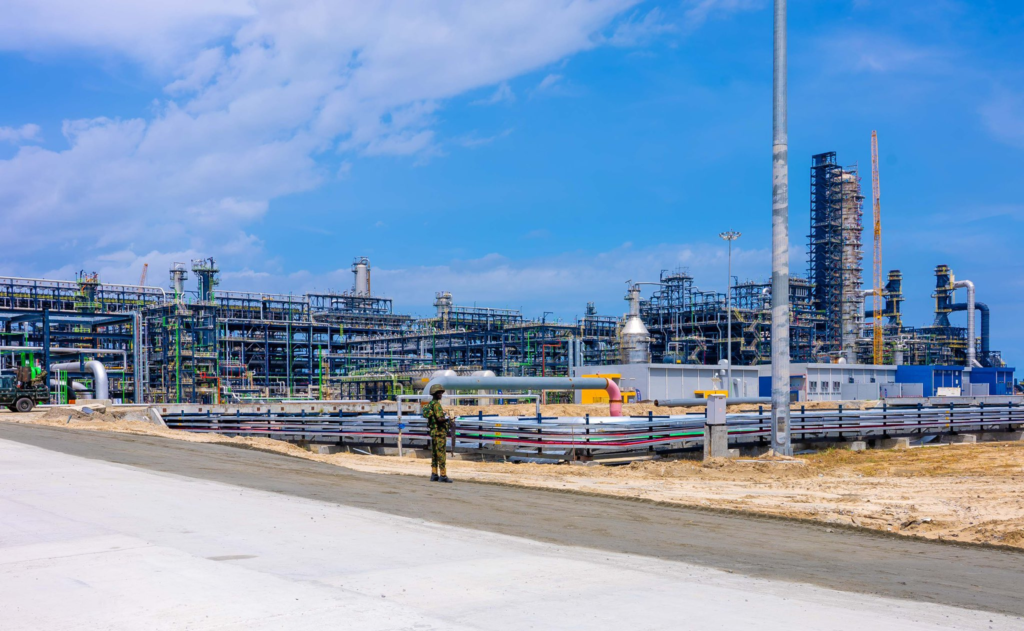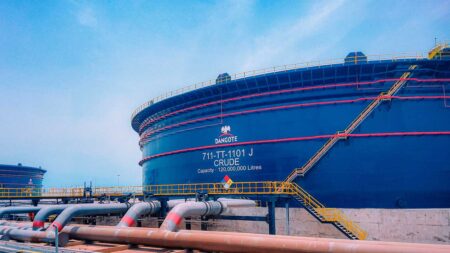The Dangote oil refinery will start operations before the end of July and will operate alongside a mega fertilizer plant, powered by a 435-megawatt power station. At full capacity, the refinery will make available at least 40 per cent of the oil products for export, resulting in significant foreign exchange earnings for Nigeria.
- The operationalization of the Dangote oil refinery is set to transform Nigeria’s energy sector.
- Valued at $18.9 million, Nigeria’s most significant investment in recent times represents the largest single-train refinery globally.
- The Dangote oil refinery represents the first such privately owned company in Nigeria.
Nigeria’s fuel crisis
Fuel prices have continued soaring in the global market. The spike in crude oil prices has resulted in an economic squeeze for most African countries that are net oil importers. Nigeria is no exception. The country has faced an ever-growing oil crisis despite vast crude oil reserves. Limited oil refining capacity remains the main driver of Nigeria’s fuel crisis, which hinders socio-economic development. The crisis has placed a high subsidy burden on the government, making Nigeria dependent on imported refined petroleum products.
Nigeria’s fuel crisis has also contributed to the proliferation of artisanal refineries within the oil-producing Niger Delta region. Such artisanal refineries have significant environmental and health ramifications.
The Petroleum Industry Act (PIA) of 2021 was meant to pave the way for increased investment in Nigeria’s crude oil refining capacity. The Act simplified the process for granting operational licenses to oil investors in the downstream oil operation. This would help increase investment interest in modular refineries. Modular refineries are simplified with daily refining capacities of 1,000 to 30,000 barrels.
Recently, Nigeria’s government’s petroleum ministry has shown more interest in modular refineries to address the deficit of petroleum products. Although modular refineries may help to solve Nigeria’s energy sector crisis, their capacity remains low and is also plagued by various operational inefficiencies. However, the operationalization of the Dangote oil refinery is set to transform Nigeria’s energy sector.
Dangote oil refinery biggest in Africa
Nigeria’s new Dangote oil refinery in the Lekki Free Trade Zone in Lagos is Africa’s biggest. The refinery will produce 650,000 oil barrels daily, spanning a range of petroleum products, including gasoline, diesel, aviation fuel, and liquefied petroleum gas (LPG). Valued at $18.9 million, Nigeria’s most significant investment in recent times represents the largest single-train refinery globally. The refinery spans 1,100 kilometres and has the capacity to handle 3 billion standard cubic feet of gas per day.
The enhanced production has the potential to address Nigeria’s energy sector crisis. Owned by Nigerian industrialist and Africa’s richest man, Aliko Dangote, the refinery will boost the country’s domestic refining capacity. Improved refined capacity will also help address the current consumption shortfall in Nigeria’s energy sector. It will also reduce oil import dependency and stimulate economic growth.
The Dangote oil refinery represents the first such privately owned company in Nigeria. Nigeria’s existing refineries have struggled with operational struggles under government control. Consequently, they have failed to meet the growing demand in Nigeria’s energy sector. Substantial imports have become inevitable, with Nigeria refining negligible amounts of its crude oil reserves.
READ MORE: Black gold: Africa moving from importer to exporter
How the Dangote oil refinery will shape Nigeria’s energy sector

Reduction in oil import dependence
The most significant effect of the Dangote oil refinery will be the expansion of local refinery capacity, which will reduce imports. The oil refinery aims to help Nigeria meet all of its refined petroleum demand with surplus products for export.
The West African nation currently imports more than 80 per cent of its refined petroleum products. Thus, the country is Africa’s largest importer of refined petroleum products. Local production from the new oil refinery will massively cut the country’s oil import bill.
There appears to be a link between Nigeria’s crude oil export dependency, its weak local refining capacity, and the subsidy. In 2020, Nigeria spent US$7.78 billion on importing refined petroleum products. In 2021, these imports rose by 45 per to US$11.3 billion.
According to Nigeria National Petroleum Corporation (NNPC) Limited, Nigeria spent $10 billion on fuel subsidies in 2022. The government is expected to have spent $7.5 billion on fuel subsidies in the first half of 2023. This represents about 24 per cent of Nigeria’s 2022 budget, leading to an unsustainable drag on public finances.
In conjunction with other refineries in Nigeria, Africa’s biggest refinery’s petroleum output should prove sufficient to satisfy the estimated daily demand of 72 million litres of petrol. In previous years, the country has experienced significant fuel shortages, increasing the cost of transportation and essential products.
Fuel price stability through the Dangote oil refinery
The operationalization of the refinery is expected to reduce fuel prices in Nigeria. This will be a significant relief for Nigerian consumers who high fuel prices have long burdened. The reduction in fuel prices will also have a positive impact on the cost of living and the overall economy.
Policymakers attributed the recent crisis in Nigeria’s energy sector to the Russia-Ukraine conflict. The price of imported petroleum increased by over 100 per cent. Government-imposed price caps caused importers to operate at a loss. In addition to eliminating Nigeria’s dependence on crude oil imports, the Dangote refinery has the potential to reduce the country’s reliance on crude oil exports, as more crude oil will be refined domestically.
Increased local crude oil refining capacity means Nigerians will pay for the refined petroleum products in naira. This will strengthen the local currency, saving the country from significant foreign exchange pressure while generating revenue from exporting refined petroleum products.
Addressing persistent fuel shortages
Despite its rich crude oil reserves, Nigeria has experienced persistent fuel shortages for many years. The frequent fuel shortages have become a major source of frustration for Nigerians, who rely heavily on these products for transportation, electricity generation, and cooking.
The country’s limited refining capacity has caused a reliance on imported refined petroleum products to meet domestic demand. This dependency on imports is exacerbated because Nigeria’s oil production is mostly focused on crude oil, which is exported to foreign refineries for processing. The impact of the fuel shortages on the Nigerian economy and society remains significant.
The Nigerian government has taken various steps to address the persistent fuel shortages, including rehabilitating the country’s refineries, the establishment of new refineries, and promoting private sector investment in the downstream sector. However, progress has been slow, and the problem persists. However, the Dangote oil refinery’s boost to Nigeria’s oil refining capacity should help the government in its quest to address the persistent fuel shortages and end the energy sector crisis.
Raising Nigeria’s fuel export capacity
The impact of the Dangote oil refinery will extend beyond Nigeria’s borders. The world remains in dire need of fuel and energy solutions following the crisis created by the Russia-Ukraine conflict and the subsequent actions on Russia, a major oil exporter. Thus, the refinery will help Nigeria get a greater say in the oil and gas sector.
According to Dangote, the new oil refinery will boost Nigeria’s efforts to meet its fuel demand while also becoming a key player in Africa’s and the global market. The Dangote oil refinery will start operations before the end of July and will operate alongside a mega fertilizer plant, powered by a 435-megawatt power station. At full capacity, the refinery will make available at least 40 per cent of the oil products for export, resulting in significant foreign exchange earnings for Nigeria.
Support for related industries and job creation
Operations in the Dangote oil refinery will also likely reduce production costs for businesses that rely on the energy sector to run their operations. Consequently, reduced production cost should increase their competitiveness on the international stage while enhancing the capabilities of the local manufacturing sector.
In addition, the refinery’s capacity to produce petrochemicals and fertilizers will offer prospects for the growth of downstream industries. Many of these sectors will utilize the refinery’s products as raw materials, developing new manufacturing sectors and establishing more employment opportunities. Moreover, the refinery operations will benefit transport businesses, housing and telecommunications, creating jobs and entrepreneurship opportunities.
The refinery employed approximately 40,000 individuals during construction, including 29,000 Nigerians and 11,000 foreign nationals. The jobs were in various fields, including engineering, construction, manufacturing, and operations. Based on media reports, the refinery’s complete operation is anticipated to generate over 250,000 direct and indirect jobs.
READ MORE: Why Africa’s biggest oil refinery may soon run into deep financial crisis











